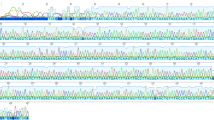Summary
Polymerase chain reaction (PCR) amplification and deoxyribonucleic acid (DNA) sequence analysis were used to identify the species origin of cell lines used in a cell culture facility where various cell lines of different species are routinely propagated. The aldolase gene family was selected for PCR amplification because the DNA sequences of this gene are highly conserved over a wide range of animals and humans. A total of 36 cell lines representing 13 different species were selected for this study. The DNA from each cell line was amplified, and PCR products were analyzed by agarose gel electrophoresis. The results showed unique profiles of amplified bands on agarose gels that allowed differentiation among non-closely related species. However, DNA amplification of closely related species, including rat and mouse or human and primate, resulted in similar and indistinguishable banding patterns that could be further differentiated by DNA sequence analysis. These results suggested that aldolase gene amplification coupled with DNA sequence analysis is a useful tool for identification of cell lines and has potential application for use in identification of interspecies cross-contamination.
Similar content being viewed by others
References
Belt, A. Characterization of culture used for biotechnology and industry. In: Hunter-Cevera, J. C.; Belt, A., ed. Maintaining cultures for biotechnology and industry. Academic Press; 1995:251–258 (San Diego, CA).
Doyle, A.; Griffithes, J. B. Identity testing—an overview. In: Doyle A.; Griffithes, J. B., ed., Animal cell culture: a practical approach, 3rd ed. Oxford University Press; 2000;78–80, Oxford, UK
Lessa, E. P.; Applebaum, G. Screening techniques for detecting allelic variation in DNA sequences. Mol. Ecol. 2:119–129; 1993.
Matsuo, Y.; Nishizaki, C. Efficient DNA fingerprinting method for the identification of cross-culture contamination of cell lines. Hum. Cell 12(3):149–154; 1999.
O'Brien, S.J.; Shannon, J.E. A molecular approach to the identification and individualization of human and animal cells in culture: isozyme and allozyme genetic signature. In Vitro 16(2):119–135; 1980.
Pruckler, M. J.; Pruckler, M. J. Detection by polymerase chain reaction of all common Mycoplasma in a cell culture facility. Pathobiology 63:9–11; 1995.
Sheets, R. History and characterization of the Vero cell line. A report by Rebecca Sheets. Rockville, MD: Center for Biologics Evaluation and Research, Food and Drug Administration; 2000
Stacey, G.N., Bolton, B. J. Multilocus DNA fingerprinting analysis of cellbank: stability studies and culture identification in human B-lymphoblastoid and mammalian cell lines. Cytotechnology 8:3–20; 1992a.
Stacey, C.N.; Bolton, B. J. DNA fingerprinting transforms the art of cell authentication. Nature 357:261–262; 1992b.
Stacey, G. N.; Hoelzl, H. Authentication of animal cell cultures by direct visualization of repetitive DNA, aldolase gene PCR and isoenzyme analysis. Biologicals 25:75–85; 1997.
Zoon K. C. Points to consider in the characterization of cell lines used to produce biologicals, Rockville, MD: Center for Biologics Evaluation and Research, Food and Drug Administration; 1993:7–8.
Author information
Authors and Affiliations
Corresponding author
Rights and permissions
About this article
Cite this article
Liu, M.Y., Lin, SC., Liu, H. et al. Identification and authentication of animal cell culture by polymerase chain reaction amplification and DNA sequencing. In Vitro Cell.Dev.Biol.-Animal 39, 424–427 (2003). https://doi.org/10.1290/1543-706X(2003)039<0424:IAAOAC>2.0.CO;2
Received:
Accepted:
Issue Date:
DOI: https://doi.org/10.1290/1543-706X(2003)039<0424:IAAOAC>2.0.CO;2




